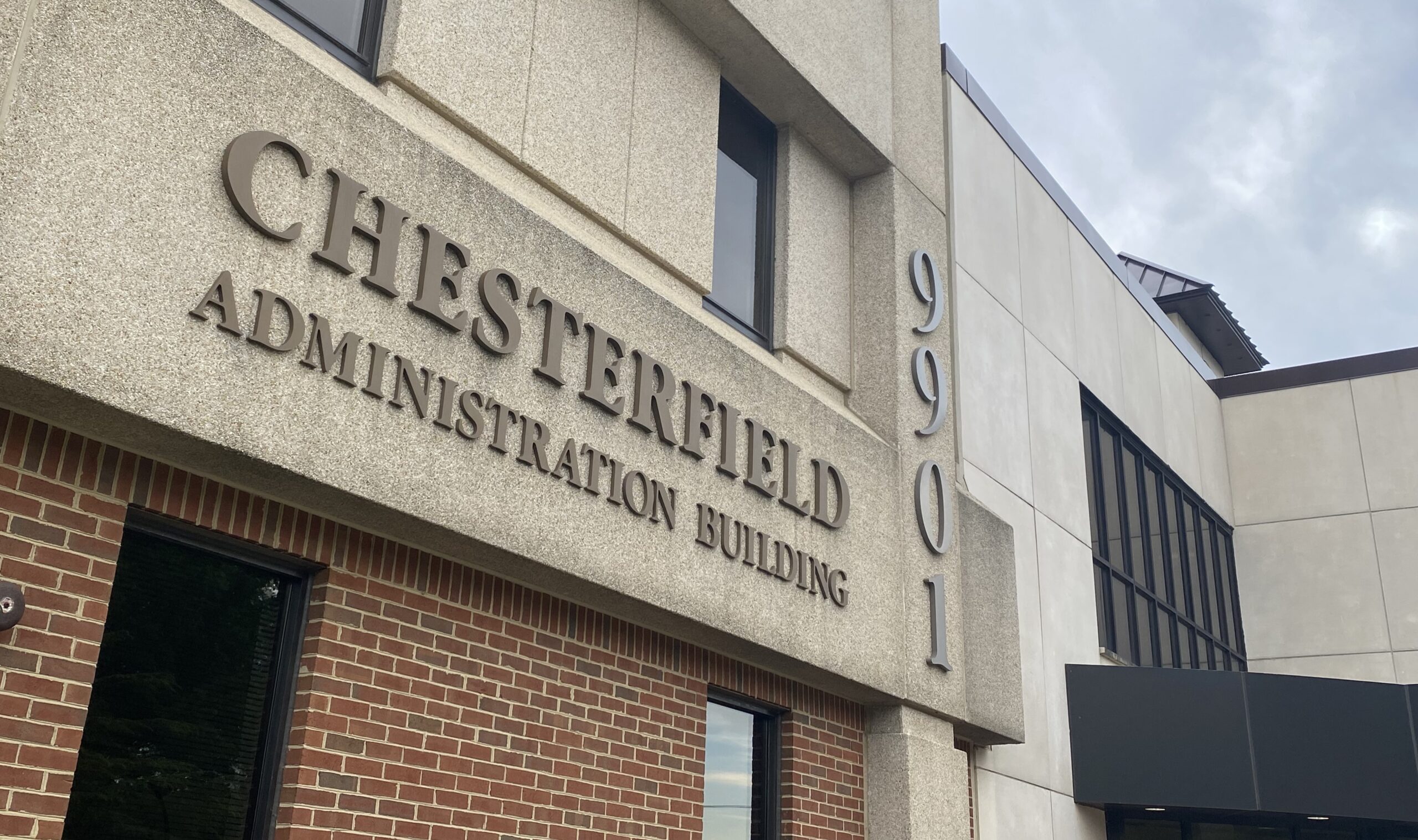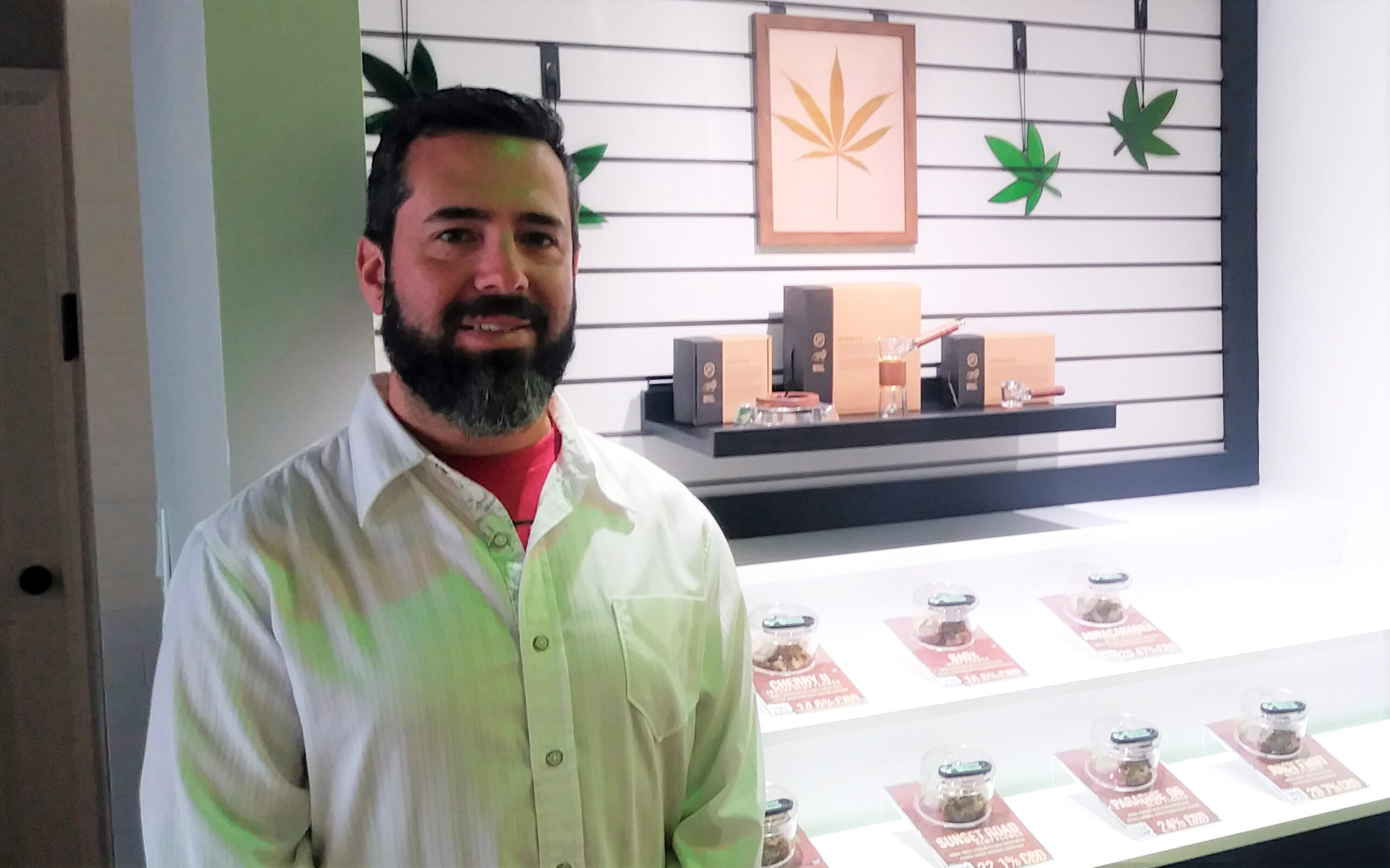
Chesterfield County has enacted zoning rules to regulate the operation of new specialty stores that sell vaping, hemp and similar products. (BizSense file)
Chesterfield County has new zoning rules on the books that introduce restrictions on specialty vaping and CBD retailers.
Approved at this week’s Board of Supervisors meeting, the rules require any new stores focused on vaping and related products to be at least 2,000 linear feet from the property line of pre-K through grade 12 schools and also the same distance away from the property lines of similar stores moving forward. Stores also will be limited to operating from 8 a.m. to 8 p.m. Monday to Sunday.
Those new limitations will apply to stores that devote 25 percent or more of their overall inventories or fill up 15 percent or more of their shelves with the county’s definition of recreational substances, which includes tobacco, vaping, hemp and kratom products in addition to related paraphernalia.
New stores are limited to commercial zoning districts (C-3, C-4 and C-5) and need to get special permission from the Board of Supervisors to operate by requesting and receiving a conditional-use permit. Future stores that want to have on-site consumption lounges are restricted to C-5 zoning.
County supervisors will have the ability to add or modify conditions of a given vape shop’s zoning approval, which could result in case-by-case permissions to operate that are more or less strict than the general regulations now on the books in the ordinance.
County officials said existing specialty stores that sell vaping and tobacco products will be grandfathered in, and will be able to continue to operate as they are even if not in line with the new requirements.
Previously, the county’s zoning ordinance hadn’t specifically address stores that sell CBD, tobacco and similar products. The creation of the policies was motivated by concerns about the use of vaping and tobacco among children.
Studies that the county staff used to guide the creation of the policies found that proximity to schools and density of the stores is linked to higher rates of smoking among adolescents, Chesterfield Planning Director Andy Gillies said.
“We found several national studies that really documented the health risks of these products as well as the risk the stores pose to vulnerable and adolescent populations when the businesses are located near schools or parks or in close proximity to one another,” he said at the board’s meeting this week.
The regulations are aimed at specialty stores and don’t apply to convenience stores and grocery stores that may carry the same products but in smaller amounts relative to their overall inventories and use of shelve space. Gillies said that decision was made because county staff found in its research that checking identification of customers is more frequent at those businesses compared with specialty shops.
“Specialty vape and tobacco shops have a significantly higher rate of violations than other types of retailers that are more regularly checking IDs at grocery stores, pharmacies and convenience stores that do have liquor licenses,” he said.
The board voted unanimously on Wednesday to approve the new zoning regulations, with board members citing a desire to establish rules on products that can pose a health risk.
“There are some responsible vape shops that are operating in the county and of course they should be able to continue to do so. This will put guardrails on any new shops coming into the county,” Supervisor Jim Ingle said.
During the public hearing that preceded the vote, three people spoke against the regulations and two people spoke in support of them.
Among the opponents of the zoning amendment was Evan Somogyi, who owns local head shop chain Kulture and CBD concept Kultivate Wellness. He has an outpost of each in Chesterfield.
Somogyi said that his employees card customers and that his stores and other specialty stores take more care in selling things such as e-cigarettes and CBD products than non-specialty retailers.
“We spend a lot of time researching the products and brands we sell. We also help educate our customers on the products they are considering and help them make informed decisions on which items to purchase,” he said. “Gas stations and convenience stores are the ones selling all these counterfeit, fake and dangerous products as well as selling to minors.”
The county’s newly minted definition of recreational substances doesn’t reference marijuana. Gillies said marijuana wasn’t included because it is federally illegal and it’s therefore a moot point for the county to address in the zoning ordinance.
“It’s not a legal land use in Chesterfield County, based on federal law,” Gillies said.
Under state law, recreational marijuana is legal to consume and possess. Virginia law also permits the sale of medical pot by a select few companies. However, Chesterfield cited federal law when it rejected a building permit sought by Green Leaf Medical to establish a medical marijuana dispensary in Midlothian. Green Leaf lost its appeal on that determination last year.

Chesterfield County has enacted zoning rules to regulate the operation of new specialty stores that sell vaping, hemp and similar products. (BizSense file)
Chesterfield County has new zoning rules on the books that introduce restrictions on specialty vaping and CBD retailers.
Approved at this week’s Board of Supervisors meeting, the rules require any new stores focused on vaping and related products to be at least 2,000 linear feet from the property line of pre-K through grade 12 schools and also the same distance away from the property lines of similar stores moving forward. Stores also will be limited to operating from 8 a.m. to 8 p.m. Monday to Sunday.
Those new limitations will apply to stores that devote 25 percent or more of their overall inventories or fill up 15 percent or more of their shelves with the county’s definition of recreational substances, which includes tobacco, vaping, hemp and kratom products in addition to related paraphernalia.
New stores are limited to commercial zoning districts (C-3, C-4 and C-5) and need to get special permission from the Board of Supervisors to operate by requesting and receiving a conditional-use permit. Future stores that want to have on-site consumption lounges are restricted to C-5 zoning.
County supervisors will have the ability to add or modify conditions of a given vape shop’s zoning approval, which could result in case-by-case permissions to operate that are more or less strict than the general regulations now on the books in the ordinance.
County officials said existing specialty stores that sell vaping and tobacco products will be grandfathered in, and will be able to continue to operate as they are even if not in line with the new requirements.
Previously, the county’s zoning ordinance hadn’t specifically address stores that sell CBD, tobacco and similar products. The creation of the policies was motivated by concerns about the use of vaping and tobacco among children.
Studies that the county staff used to guide the creation of the policies found that proximity to schools and density of the stores is linked to higher rates of smoking among adolescents, Chesterfield Planning Director Andy Gillies said.
“We found several national studies that really documented the health risks of these products as well as the risk the stores pose to vulnerable and adolescent populations when the businesses are located near schools or parks or in close proximity to one another,” he said at the board’s meeting this week.
The regulations are aimed at specialty stores and don’t apply to convenience stores and grocery stores that may carry the same products but in smaller amounts relative to their overall inventories and use of shelve space. Gillies said that decision was made because county staff found in its research that checking identification of customers is more frequent at those businesses compared with specialty shops.
“Specialty vape and tobacco shops have a significantly higher rate of violations than other types of retailers that are more regularly checking IDs at grocery stores, pharmacies and convenience stores that do have liquor licenses,” he said.
The board voted unanimously on Wednesday to approve the new zoning regulations, with board members citing a desire to establish rules on products that can pose a health risk.
“There are some responsible vape shops that are operating in the county and of course they should be able to continue to do so. This will put guardrails on any new shops coming into the county,” Supervisor Jim Ingle said.
During the public hearing that preceded the vote, three people spoke against the regulations and two people spoke in support of them.
Among the opponents of the zoning amendment was Evan Somogyi, who owns local head shop chain Kulture and CBD concept Kultivate Wellness. He has an outpost of each in Chesterfield.
Somogyi said that his employees card customers and that his stores and other specialty stores take more care in selling things such as e-cigarettes and CBD products than non-specialty retailers.
“We spend a lot of time researching the products and brands we sell. We also help educate our customers on the products they are considering and help them make informed decisions on which items to purchase,” he said. “Gas stations and convenience stores are the ones selling all these counterfeit, fake and dangerous products as well as selling to minors.”
The county’s newly minted definition of recreational substances doesn’t reference marijuana. Gillies said marijuana wasn’t included because it is federally illegal and it’s therefore a moot point for the county to address in the zoning ordinance.
“It’s not a legal land use in Chesterfield County, based on federal law,” Gillies said.
Under state law, recreational marijuana is legal to consume and possess. Virginia law also permits the sale of medical pot by a select few companies. However, Chesterfield cited federal law when it rejected a building permit sought by Green Leaf Medical to establish a medical marijuana dispensary in Midlothian. Green Leaf lost its appeal on that determination last year.



